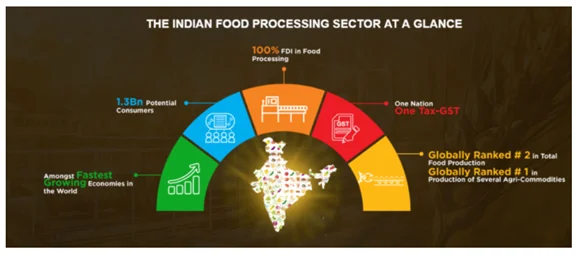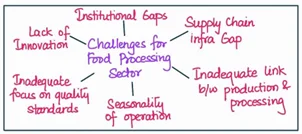Answer:
| Approach:
Introduction
- Give a brief about the food processing sector.
Body
- Enlist the challenges faced in the food processing sector.
- Elaborate the policy taken to address these issues.
Conclusion
- Conclude stating that policy measures are in the right direction, but there is much to be done.
|
Introduction:
The food processing industry encompasses a wide range of activities, including the processing, preservation, packaging, and distribution of food products. It also includes the process of value addition to produce food products through methods such as preservation, the addition of food additives, drying, etc.



Body:
Challenges in food processing industry:

- Poor supply chain linkage: Lack of mechanization, high seasonality, perishability, and lack of proper supply chain results in a lack of availability of raw material. Due to inadequate infrastructure, more than 30% of the produce from the farm gate is lost as waste.
- Infrastructure bottlenecks: FPIs need world class infrastructure and logistics support in order to reduce wastage. This would require support from Railways as well as Airways.
- Unskilled manpower: The existing manpower in the farming industry needs to be trained in order to be employable in the FPI sector.
- Quality adherence low: Neither the crops nor the finished food is graded according to the quality. This poses a challenge as high-quality processed food in other markets act as competitors against the low-quality product. This limits export potential.
- Low level of processing in certain sectors: Sectors like Fisheries (8%), Poultry (6%), Horticulture food (2%), Consumer foods & Grains have low processing infrastructure. These sectors also show seasonality of operations and low-capacity utilisations;
- Not having enough product development and innovation.
- Deficiencies in the Regulatory Environment: There are numerous laws, under the jurisdiction of different ministries and departments, which govern food safety and packaging.
Policy measures taken for the food processing industry:
- Pradhan Mantri Kisan Sampada Yojana (PMKSY): It is an umbrella scheme that incorporates various ongoing schemes like Mega Food Parks, Integrated Cold Chain, etc.
- Mega Food Parks Scheme: It aims at providing a mechanism to link agricultural production to the market particularly in the rural sector. A Mega Food Park entails an area of a minimum of 50 acres and works in a cluster-based approach based on a hub and spokes model. Here the government bears the cost of developing the common infrastructure such as packing labelling, weighing machines.
- Scheme of Cold Chain, Value Addition and Preservation Infrastructure: It covers pre-cooling facilities at production sites, reefer vans, mobile cooling units as well as value addition centres.
- Allowing 100% FDI through automatic route into this sector is also a significant step.
- PM Formalization of Micro Food processing Enterprises: This scheme aims at helping small micro-units engaged in the food processing industry.
- ‘Operation Greens’: Food Processing Ministry provides subsidies to the farmer self-help groups, food processing companies etc. for processing, transportation & cold storage of Tomato, Onion and Potato (TOP), to ensure their round the year availability in market at a reasonable price.
Conclusion:
For unhindered growth, it becomes important to address the demand and supply-side constraints of food processing in India. The government has taken several policy measures to meet the challenges faced by the food processing sector. When properly implemented, these measures would make both agriculture production and agricultural exports much more profitable and sustainable.




